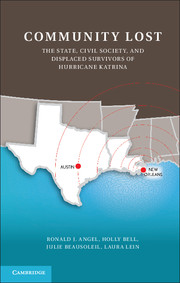Book contents
- Frontmatter
- Contents
- Acknowledgments
- Introduction
- 1 After the Storm
- 2 An Emerging Methodology for a Crisis Situation
- 3 Life before the Storm
- 4 Evacuation and Arrival in Austin
- 5 The Limited Transportability of Social Capital
- 6 Civil Society, NGOs, and the Grassroots Response
- 7 Housing, Employment, and Identification
- 8 Health Care and the Limitations of Civil Society
- 9 The State, Civil Society, and the Limitations of Social Capital
- Bibliography
- Index
5 - The Limited Transportability of Social Capital
Published online by Cambridge University Press: 05 June 2012
- Frontmatter
- Contents
- Acknowledgments
- Introduction
- 1 After the Storm
- 2 An Emerging Methodology for a Crisis Situation
- 3 Life before the Storm
- 4 Evacuation and Arrival in Austin
- 5 The Limited Transportability of Social Capital
- 6 Civil Society, NGOs, and the Grassroots Response
- 7 Housing, Employment, and Identification
- 8 Health Care and the Limitations of Civil Society
- 9 The State, Civil Society, and the Limitations of Social Capital
- Bibliography
- Index
Summary
Companionship and intimate human contact are basic human needs even for the affluent. For those with little wealth and low incomes, the strong bonding ties and mutual support of family and local social networks are vital for survival (Edin & Lein, 1997; Stack, 1974). The affluent may have the option of isolating themselves since their material well-being is secure. The poor do not have that luxury. As we have seen in previous chapters, even among those survivors who told us about the serious problems that beset their old New Orleans neighborhoods, their stories also conveyed a sense of familiarity and community and, in many cases, social and material support. As important as weak ties are for information gathering, they are no substitute for the emotional and material security that only strong ties can provide. In this chapter, we address the question of how local or place-bound such ties are. Although weak ties do not depend on place, strong ties that are based on more intimate interactions and more frequent contact appear to be less transportable from one place to another.
The differences between the experiences of survivors who evacuated before the storm and those who evacuated after illustrate how varying levels of social capital influenced survivors’ long-term outcomes. Those who evacuated on their own before the storm were in the minority in our sample and, as we shall see, consisted mostly of a group with higher levels of human and social capital than those who were evacuated after the storm. Much of the difference between these groups had to do with their ability to rebuild a sense of community in their new neighborhoods. Among the most important factors that affected that ability was access to adequate housing. Those with more human, social, and material capital had more success finding adequate housing than those with fewer of these resources. We will begin our discussion of rebuilding “community”; then we discuss housing policy in the United States. Before proceeding, let us examine aspects of community and the nature of the strong and weak ties that structure human interactions and define community.
- Type
- Chapter
- Information
- Community LostThe State, Civil Society, and Displaced Survivors of Hurricane Katrina, pp. 100 - 122Publisher: Cambridge University PressPrint publication year: 2012



